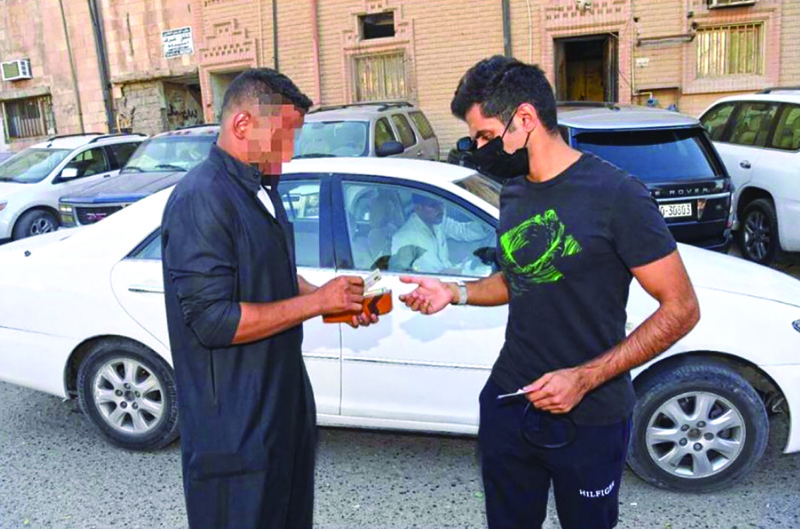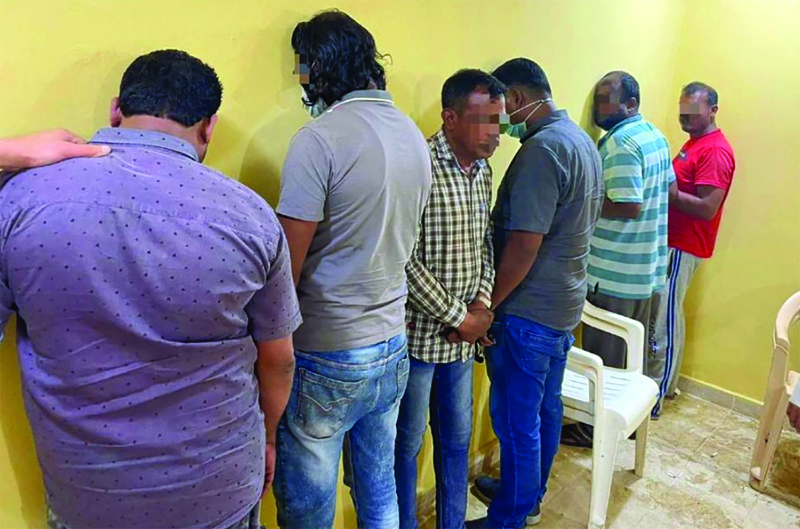 A plainclothes policeman checks the identification of a resident during a recent raid in Jleeb Al-Shuyoukh.
A plainclothes policeman checks the identification of a resident during a recent raid in Jleeb Al-Shuyoukh.By Ben Garcia
For almost two weeks now, security authorities have been cracking down on illegal residents in all governorates of Kuwait, blocking streets and setting up checkpoints to ensure all violators are caught and deported. The crackdowns are the largest police campaigns against illegal residents in Kuwait since authorities announced multiple amnesties during the pandemic, allowing residents without valid visas to either legalize their status or leave the country.
But some illegal residents are experts in the art of hiding. Violeta (not her real name), a Filipina who has lived most of her life in Kuwait illegally, said she will stay in Kuwait until state security officers drag her to the airport. "I have been arrested for illegal residency many times, but the police always let me go," she told Kuwait Times. "I don't know why, but I suspect it's because of my old age," she said.
Violeta, 66, has been an illegal resident since 2002. Violeta came to Kuwait in 1999 and worked as a domestic helper for two years with her employer before running away. "I know I should not have done that. I told them to send me home but they didn't listen, so I ran away," she said.
 People arrested during the crackdown are seen.
People arrested during the crackdown are seen.After Violeta absconded from her sponsor's house, she stayed for a couple of months with a friend before moving to her present accommodation in Maidan Hawally. She then started accepting toddlers of working parents to babysit. "I started caring for children in the area for KD 30, which later rose to KD 70 to KD 80 per child. I stopped babysitting as I got older and could not provide good service. Now I am cooking and delivering Filipino food in the neighborhood," she said.
In the early years without an iqama, Violeta barely left her room. "I would sometimes go around, but I made sure I was safe from security checks. Most of the time I would go to the old souq by foot and avoid main streets," she said. Violeta has three grown-up children in the Philippines and hasn't returned to her family since 1999. "I don't have a husband anymore. We separated a long time ago and he died five years ago in the care of his new family. That's why I didn't bother to go home."
Nanay Camella, 69, has been without an iqama for the last two months because of her age. "After 30 years in Kuwait, this is my first experience without an iqama," she said. "This is because I can no longer renew my visa because of my age. I want to stay in Kuwait to earn money, but I am preparing for the eventuality that I will be caught one day. I am illegal now - that is why I sent home to Mindanao all my belongings and things that I don't need here. I can sense that my time is up, so I am ready," she told Kuwait Times.
"In the event that I am apprehended and deported, at least everything is settled. I don't have any problem with people around me," she said. "I am afraid of checking and the police, but I am readying myself for anything. I know there will come a time when I have to bid goodbye to the country I love after the Philippines," she added resignedly. Nanay used to go home to the Philippines often, but during the pandemic she wasn't able to leave the country. The last time she went home was in 2016.
The crackdowns follow two consecutive amnesties announced in 2020. The first amnesty in April 2020 allowed illegals to leave the country without paying fines and with a free air ticket. Authorities said around 30,000 expats of various nationalities benefited from the amnesty.
The second amnesty for illegal residents - estimated at around 150,000 people - began in Dec 2020 and was later extended for several months. During that period, the interior ministry asked all residents living in the country on temporary visas, which had been automatically extended during the pandemic, to legalize their stay in the country or leave. No official statistics were released about the number of people who availed the amnesty.










